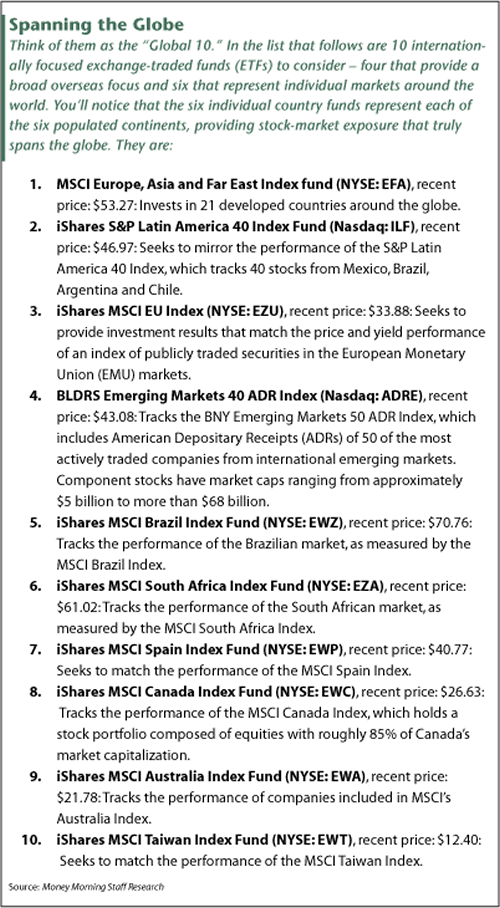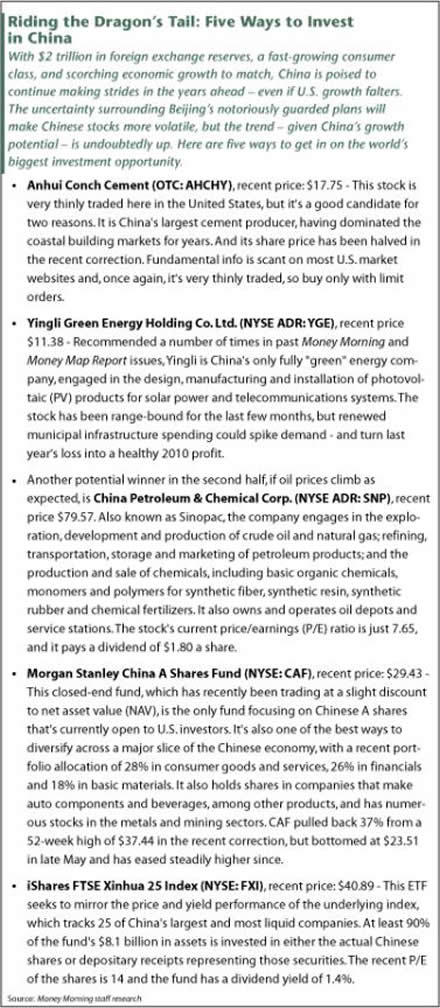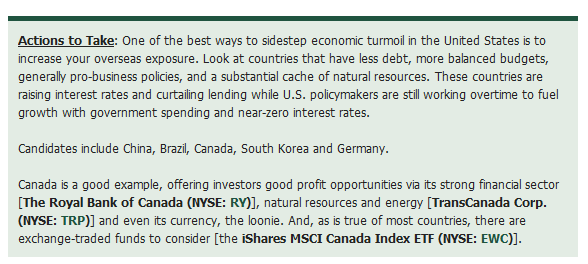Protection From a Double-Dip Economic Recession Going Global
Economics / Double Dip Recession Aug 19, 2010 - 05:39 AM GMTBy: Money_Morning
 Jason Simpkins writes:
The last time the U.S. economy suffered through a double-dip recession, this country was struggling to overcome the fallout from an Arab oil embargo, Vietnam War-era deficits, and an inflationary spiral that just wouldn't let go.
Jason Simpkins writes:
The last time the U.S. economy suffered through a double-dip recession, this country was struggling to overcome the fallout from an Arab oil embargo, Vietnam War-era deficits, and an inflationary spiral that just wouldn't let go.
That 1981-82 double-dip downturn - the result of an economic "shock treatment" aimed at curing those ills - consisted of two recessions that were separated by a single quarter of growth.
 The current backdrop is very different from the one that was in place back then, but the threat of a double-dip recession is no less real.
The current backdrop is very different from the one that was in place back then, but the threat of a double-dip recession is no less real.
The world's No. 1 economy lost 8.4 million jobs during the recession that got its start in December 2007, making it the worst national downturn since the Great Depression and the biggest loss of employment since the end of World War II.
The U.S economy shrank a larger-than-expected 4.1% from the fourth quarter of 2007 to the second quarter of 2009, the Commerce Department recently reported. Household spending fell 1.2% last year - the biggest decline in 67 years and double what was previously believed, the government said.
The unemployment rate remained unchanged at 9.5% in July, as the economy shed 131,000 jobs. What's more, the number of U.S. workers filing new claims for jobless benefits unexpectedly rose last week to 484,000 - the highest level in nearly six months.
"Unemployment is the most important problem we have right now," Bernanke told the House Financial Services Committee. He expects the unemployment to remain above 7% throughout 2012.
After expanding by 5% in the 2009 final quarter, U.S. gross domestic product (GDP) advanced at a slower 3.7% pace in the first three months of the New Year - before skidding to a much-slower-than-expected 2.4% pace for the second quarter.
That stumble prompted economists to slash their U.S. growth forecasts to 2.3% (from 3.3%) for the current quarter, and to cut their full-year targets to 2.9% for 2010 and 2.6% for 2011. As we've already seen, however, those projections are overly optimistic, ignoring the very real possibility of another full-blown downturn - the textbook definition of a double-dip recession.
And that means it's no longer advisable to stand pat. Investments exist that can meet the dual objectives of creating a safe haven from an economic maelstrom - while at the same time providing investors with some major capital gains.
Gold is one such investment. And Part I of this investment series, "Three Ways to Brace for a Double-Dip Recession: Going for the Gold," discussed ways investors could acquire the yellow metal.
Today (Thursday), we'll look at another way investors can brace for a double-dip recession: Going global.
Fundamental Foreign Holdings
One of the best ways to sidestep economic turmoil in the United States is to increase your exposure abroad. Let your investments do some traveling, by investing in countries that have less debt, more balanced budgets, generally pro-business policies, and a substantial cache of natural resources.
We're talking about China, Brazil, and Canada, among others. These countries are raising interest rates and curtailing lending while U.S. policymakers are still working overtime to fuel growth with government spending and near-zero interest rates.
Consider Canada, for example. For a long time that country was dependent on U.S. industry for jobs, but our northern neighbor has suddenly come into its own.
 While high unemployment continues to hamstring the U.S. economy, Canada already has recouped 403,000 jobs, or 97% of those lost in the recession. Canada's national unemployment rate stands at 8%, compared to 9.5% in the United States.
While high unemployment continues to hamstring the U.S. economy, Canada already has recouped 403,000 jobs, or 97% of those lost in the recession. Canada's national unemployment rate stands at 8%, compared to 9.5% in the United States.
The Bank of Canada raised its benchmark-lending rate to 0.75% in July, making Canada the first Group of Seven (G7) nation to raise interest rates. The International Monetary Fund (IMF) recently said that Canada is likely to be the first of the seven major industrialized democracies to return to a budgetary surplus status by 2015.
The country also has a sound banking sector that wasn't taken in by the untrustworthy assets that brought down U.S. financials.
"Canada largely sidestepped the entire global financial crisis of the past four years because its highly regulated banks were prohibited from securitizing mortgage debt to the extent that was widely practiced in the United States," said Money Morning Contributing Writer Jon D. Markman. "Canada's banks also were banned from taking on high levels of leverage to make larger and riskier loans. Suddenly, Canada is being held up as a shining light of sobriety, daring, common sense, and strong returns."
Money Morning Contributing Editor Peter Krauth, a Canadian himself, says the country offers a bevy of opportunities.
"My first suggestion is to consider the loonie, as the Canadian dollar is affectionately known," Krauth said in a recent interview. "Back in 2002, the loonie bought as little as USD $0.62. In October 2007, currency traders had pushed that rate to USD $1.10. Today, we sit near USD $0.96, and the loonie is a good bet to hold its value, and even to appreciate against its U.S. counterpart."
The Royal Bank of Canada (NYSE: RY) and Potash Corp. (NYSE: POT) are two other strong options. In fact, Potash stock surged more than 30% this week after Australian mining giant BHP Billiton Ltd. (NYSE ADR: BHP) offered to buy the company for $38.56 billion.
Krauth predicted that this deal would happen in a Money Morning article back in March.
But with Potash shares trading at 13% above the Billiton bid, it's clear that shareholders are underwhelmed by the offer. And that says that this is far from being a done deal, meaning Potash may remain as a future potential investment. Stay tuned.
Meanwhile, Money Morning Contributing Editor Horacio Marquez likes TransCanada Corp. (NYSE: TRP).
"TransCanada is the largest pipeline and utility company in Canada, and as such, it is a critically important strategic company for the country and has superior access to capital, even in the worst of times," says Marquez. "These attributes alone make it a desirable core position in any portfolio."
Also consider Australia and Brazil, which have economies that are very similar to Canada's. All three countries are commodity-rich and fiscally sound. Australia's benchmark interest rate stands at 4.5% and Brazil's at 10.75%. And they all have very vibrant mining sectors.
Brazil and Australia are the world's two largest producers of iron ore - the key ingredient in making steel. And while Australia has rich deposits of coal to fuel energy consumption, Brazil has large deposits of oil lying just off its shores.
You would do well to gain exposure either to Brazil's Vale (NYSE ADR: VALE) or Australia's Rio Tinto PLC (NYSE ADR: RTP) - two of the world's largest iron ore producers.
Petroleo Brasileiro SA (NYSE ADR: PBR) would get you access to Brazil's burgeoning oil industry. And if you're looking for a more balanced play, you can find it in the iShares MSCI Brazil exchange-traded fund (NYSE: EWZ).
Asian Tigers
In addition to applying sound domestic policies, Canada, Australia, and Brazil also have been benefited from rapid growth in the Far East, especially China.
China has some $2 trillion in foreign exchange reserves, a fast-growing consumer class, and scorching economic growth to match. Its economy expanded by 11.9% in the first three months of the year and by 10.3% in the second-quarter. And the only reason growth decelerated is because the central government deliberately curbed lending to prevent the economy from overheating. Now that it's accomplished its goal, Beijing will almost certainly take its foot off the brake.
"From an investment perspective, the single biggest concern right now is how hard and for how long the Chinese government will keep tapping on the brakes," says Money Morning Chief Investment Strategist Keith Fitz-Gerald. "I personally don't think it's going to be too much longer - an easing sometime in the third quarter now seems realistic."
 The uncertainty surrounding Beijing's notoriously guarded plans will make Chinese stocks more volatile, but the trend - given China's growth potential - is undoubtedly up.
The uncertainty surrounding Beijing's notoriously guarded plans will make Chinese stocks more volatile, but the trend - given China's growth potential - is undoubtedly up.
"Chinese stocks are definitely going to be fairly volatile in the coming months, if only because the markets are still relatively immature and the government is going to keep a very careful watch on them to keep growth in check," said Fitz-Gerald. "However, there will be plenty of bullish pressure on prices because the money that's been targeting real estate speculation - now blocked by the government restrictions - will be channeled into stocks."
Of course, China isn't the only red-hot economy in Asia. In fact, Money Morning Contributing Editor Martin Hutchinson is very high on South Korea. South Korea's GDP was up 7.2% year-over-year in the second quarter, after surging 8.2% in the first three months of 2010.
"At the moment, economic conditions in Korea are about the best in the world," says Hutchinson. Analysts expect South Korea's growth to slow - to 5.9% in 2010 and 4.2% in 2011, "but those projections appear somewhat conservative to me. The balance of payments is positive, with a surplus of 3.1% of GDP, while the budget deficit is small at 2.1% of GDP and will presumably decline as expansion continues."
For those concerned about the possibility of war with North Korea, Hutchinson says the risk is minimal.
"In any conversation about a Korea investing strategy, one question always comes up: What about the potential for war with North Korea? Well, to say the least, the odds of such a confrontation are relatively low," he says. "Given that, some investors may be able to look to Korea for as much as 20% of their portfolio, if other conditions are right."
Hutchinson recommends the following stocks:
•KT Corp. (NYSE ADR: KTC): Formerly Korea Telecom, KT is Korea's leading fixed-line telecom-services provider, which was privatized in 2002. It recently merged with its mobile supplier KT Freetel Corp., a key reason that first-quarter earnings doubled.
•LG Display Co. Ltd. (NYSE ADR: LPL): A leading manufacturer of thin film liquid crystal displays, LG Display shares were recently trading at 7.6 times 2009 earnings and 4.5 times prospective 2011 earnings. Given the importance of its products to the global consumer electronics sector.
•Posco (NYSE ADR: PKX): Korea's largest steel company, Posco was recently trading at a P/E of 11 times trailing earnings and 9.4 times prospective 2011 earnings. Posco has large export operations to China, making it a big beneficiary of China's explosive growth. Posco is the world's third-largest steelmaker, and it's most efficient in terms of output per man-hour. Like KEP, Posco suffers from rising prices of raw materials - in its case, iron ore - which have risen sharply in price. The shares are in the low end of their recent range.
•Woori Finance Holdings Co. Ltd. (NYSE ADR: WF): Korea's second-largest finance group, Woori has suffered bad debt losses like all Korean banks, but has avoided some of the strategic blunders of KB.
•The iShares South Korea ETF (AMEX: EWY): This ETF invests in the Morgan Stanley Capital International Korea index, with a P/E ratio of 10, but a yield after expenses of only 0.7%.
If the U.S. economy does backslide into a double-dip recession, much of the world will feel the impact. But the countries and companies discussed in this report will be less vulnerable to another global downturn. And regardless of any short-term turbulence, their long-term futures remain bright - at least brighter than that of the United States.

Source : http://moneymorning.com/2010/08/19/u.s.-economy-5/
Money Morning/The Money Map Report
©2010 Monument Street Publishing. All Rights Reserved. Protected by copyright laws of the United States and international treaties. Any reproduction, copying, or redistribution (electronic or otherwise, including on the world wide web), of content from this website, in whole or in part, is strictly prohibited without the express written permission of Monument Street Publishing. 105 West Monument Street, Baltimore MD 21201, Email: customerservice@moneymorning.com
Disclaimer: Nothing published by Money Morning should be considered personalized investment advice. Although our employees may answer your general customer service questions, they are not licensed under securities laws to address your particular investment situation. No communication by our employees to you should be deemed as personalized investent advice. We expressly forbid our writers from having a financial interest in any security recommended to our readers. All of our employees and agents must wait 24 hours after on-line publication, or 72 hours after the mailing of printed-only publication prior to following an initial recommendation. Any investments recommended by Money Morning should be made only after consulting with your investment advisor and only after reviewing the prospectus or financial statements of the company.
Money Morning Archive |
© 2005-2022 http://www.MarketOracle.co.uk - The Market Oracle is a FREE Daily Financial Markets Analysis & Forecasting online publication.



